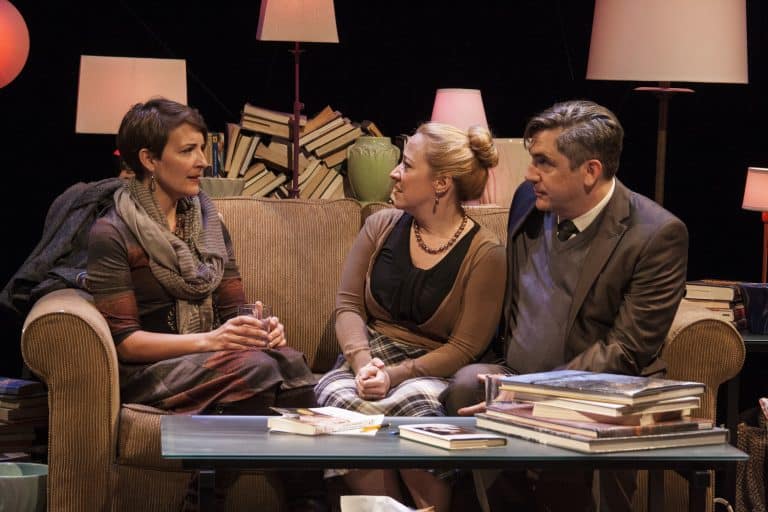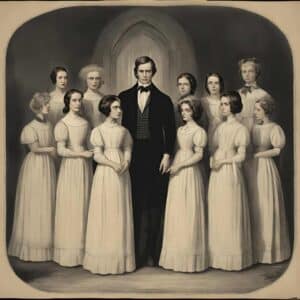
It would be awkward, for one thing.
That is one of the takeaways from Pilot Program, a play included in the collection Third Wheel by Melissa Leilani Larson. I saw it live when it premiered at Plan-B Theatre Company in Salt Lake City.
I was nervous to attend, because I knew I’d have to think about polygamy for two straight hours. Two whole minutes of thinking about polygamy is usually a little much for me. The problem is that I don’t believe in it enough. Also, I believe in it too much. Polygamy disgusts me, angers me, and leads me to question my identity as a Mormon. And it scares me. What if it really is God’s will? What if it is practiced in the eternities? What if church leaders brought it back?
Pilot Program explores the answer to that last question. The premise: church leaders extend a calling to a modern Mormon couple to add another wife to their family as part of a restoration of polygamy. The first scene opens with the stunned couple, Abby and Jake, coming home from church after meeting with their stake president about the call.
They aren’t religious fanatics. Abby, in particular, is a liberal-leaning professional woman. She’s not the stereotypical dupe of a cult. Neither is Heather, the woman they ask to join them as the second wife. I wanted both of them to say, “No.” I was sitting on the edge of my seat, trying to will them to go a different direction.
I feel the same way about real women like Eliza R. Snow and Emmeline B. Wells. They were ardent feminists, professionals, women who were ahead of their time. These real women didn’t fit the stereotypes either. Why would they get involved in polygamy?
In the play, Abby recognizes the patriarchy in this situation. She feels the insult to womankind, and to her, specifically. This calling, like so many in the church, is all about her husband.
“They don’t want me in this scenario,” she tells Jacob. “I’m the broken one. They want you.”
Heather is insulted, too. “There’s nothing wrong with being single at thirty-three,” she points out. 
And yet, both of these women are Mormon, like me, like Eliza, like Emmeline. And they have reasons for the choices they make. Maybe they aren’t rational reasons, but they aren’t irrational either. Even as I tried to will the characters to run away, I simultaneously understood them and empathized with them. I thought about it much longer than the two-hour duration of the play.
The end of the play was unsatisfying to me. I wanted something more, some closure. But then, historically, the actual end of Mormon polygamy was unsatisfying, too: just a proclamation that we weren’t practicing it anymore because of legal issues (but we were). No one denounced the practice as wrong. They still don’t. Divine threats against women who won’t comply with polygamy are canonized in our scriptures. Accommodations for polygamy linger in our temple marriage ceremonies and policies. Polygamy could come back. It never went away, really.
You can read the script of Pilot Program within the collection, Third Wheel: Peculiar Stories of Mormon Women in Love by Melissa Leilani Larson. The collection also features the play Little Happy Secrets.






8 Responses
I recently read both plays in Third Wheel and was so moved by them. I loved Little Happy Secrets more, even though I admit I was willing that ending to be different, too. 🙂 I think one of the reasons I preferred that one is because it was so, so funny, even in the midst of sometimes being so, so sad. When I read Pilot Program, I mostly just felt the weight of it. And then I sat on a panel with the playwright and she described it as “an experiment in awkwardness.” Did you sense the awkwardness as you watched? Did it seem funny to see it played out (rather than just read out)? I’m curious if other people’s reading reactions match mine. I also recommend both plays wholeheartedly.
“Awkward” is exactly how I would describe it. And the awkwardness was funny, while it was also uncomfortable.
Thanks for the review. I devoured both of these plays. I found myself in tears at the end of Happy Little Secrets, but Pilot Program was haunting. In the conversation leading up to their decision I, like you, found myself wanted to shout at them, “No! Don’t do it! It’ll wreck your lives!” I don’t think I could have stopped myself if I’d been present at a live performance!
And oh! the awkwardness! I cringed when they described walking into church on that first Sunday as a family- arm in arm in arm.
But this play challenged some of the assumptions I’ve made about polygyny. I appreciated the turmoil they faced, weighing this decision, and how it ultimately came down on the wife’s shoulders. The sacrifices everyone had to make, but mostly the women.
How sad that no one reminded Heather, pathetically single at 33, that if she chose NOT to accept this opportunity to “hold” the priesthood and enjoy the blessings of temple marriage and a family of her own in this life that she would have every opportunity in the next. Because everyone knows the Celestial Kingdom will be CRAWLING with desperate, temple worthy, single young men wondering where all the good women have gone.
Following up on your sarcasm, I agree that the Celestial Kingdom will NOT be crawling with single men. So, married ladies, what is going to happen to all the righteous single women in this Church? Out with the trash? You don’t care as long as you don’t have to share?
This book sounds very interesting! I’ve always wondered how people were able to put up with polygamy in our church’s history. I also wonder what it would be like if things were reversed and if it was polyandry (the practice of a woman having more than one husband) that was brought into the church. That would make an interesting play as well!
Thanks for your review and commentary, April. The story sounds kind of soul-crushingly awful, but also fascinating.
Being a Mormon got so much easier when I concluded a few years ago that polygamy was just an epic mistake and I don’t have to worry about it for one more minute because it’s just not a thing from God. Whew! So I could see this play and just chuckle about the oddities of my faith instead of having a massive, emotional upheaval anticipating what I would do if confronted with polygamy. Thanks for the review.